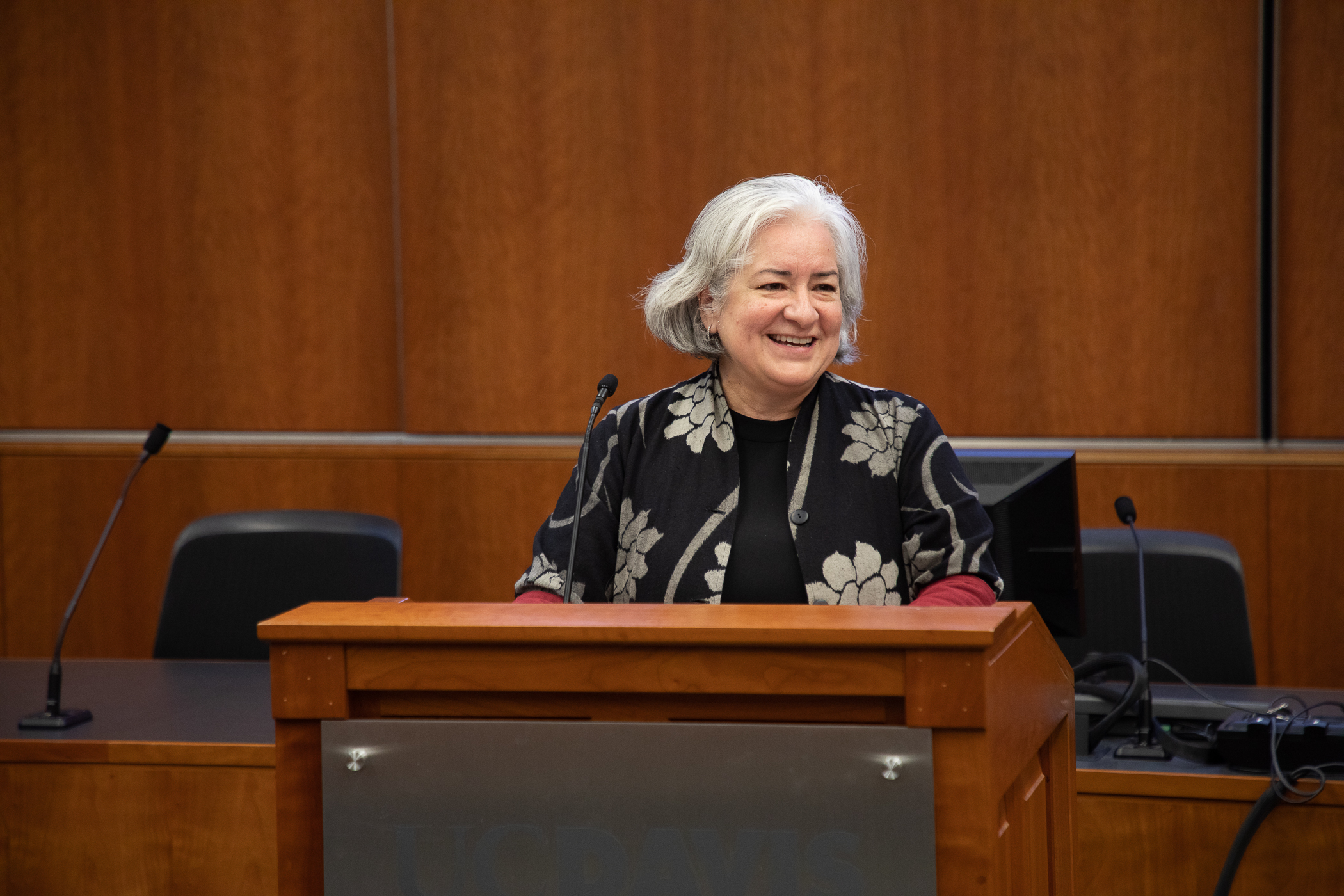Professor Saucedo Combines Theory, Practice in Senior Role with MALDEF
By Carla Meyer

Professor Leticia Saucedo has found a certain “synergy” to her dual roles as King Hall faculty member and National Senior Counsel for the Mexican American Legal Defense and Educational Fund.
Saucedo supervises MALDEF attorneys around the country, bringing to the venerable Latino civil rights organization insights gained during two decades as a scholar who “looks at the forest while everybody’s in the trees,” she said.
In turn, through knowledge obtained from working MALDEF cases, Saucedo can impart to her students that “it’s not all about policy and the bigger picture, but that there is actual skill in bringing that all down to the trees level.”
A full-time MALDEF attorney for four years before entering academia in 2003, Saucedo assumed her two-year, half-time National Senior Counsel role in July 2021. From her distinct vantage point as a practitioner and a leading scholar in employment, labor and immigration law and their intersections, Saucedo can assess how theories she and fellow scholars have presented play out in the field -- within an organization that encourages such considerations.
“The synergy between the practice and the theory works its way out in MALDEF,” Saucedo said. “It has always been this wonky place – nerdy in the sense that it is high-quality litigation and people are always thinking about, ‘What happens if we make this argument in this case?’ or ‘Here is an issue affecting our community -- how do we tackle that issue through litigation?’’’
Saucedo began her initial stint with MALDEF in San Antonio not long after graduating from Harvard Law School. Previously a community and union organizer, Saucedo had entered law school “already thinking in terms of tactics and strategy,” she said, and found MALDEF’s wide-lens approach aligned with hers. She took on education, employment and immigration cases, including a mass-action employment discrimination case involving primarily immigrant workers.
Saucedo always kept in touch with MALDEF colleagues after her transition to academia, and would discuss her research on immigrant workplaces with the organization’s President and General Counsel Thomas Saenz. The timing was perfect when MALDEF called Saucedo in 2021 about possibly assuming a new role while Vice President of Litigation Nina Perales was busy with voting-rights cases.
“I never thought of leaving academia, but the pandemic really made people think about how they do their work, what kind of work they are doing, and how the work they are doing is effective,” Saucedo said. “Tom basically gave me the opportunity to … investigate the very cases I have been thinking about and writing about for 25 years.” With the full support of UC Davis Law Dean Kevin R. Johnson, Saucedo began her stint with MALDEF while still performing law school duties, including teaching Torts in the spring.
While supervising beginning and mid-career MALDEF litigators, Saucedo tries to “really think through their eyes – the arguments they are making in their cases, and the arguments the other side is making,” to help them strategize, she said. At the same time, she gathers ideas for future research.
“I will think, ‘OK, this is an issue we need to look at as academics, outside of litigation, but I can’t think about it now because I am about to prepare for a deposition.’ It is almost like working in a live lab, where the research will come up as you do the work.”
MALDEF and King Hall converge again on the topic of banking access, where colleague Professor Shayak Sarkar “is theorizing and MALDEF is doing its work,” Saucedo said. Sarkar’s groundbreaking 2021 California Law Review article “Capital Controls as Migrant Controls” explored the use of capital as a tool for immigration control, through bank deregulation and national security measures that erect financial barriers. As Saucedo detailed in her illuminating fall 2022 Racial Justice Speaker Series talk “Banking Access as a Civil Right,” MALDEF has sued financial institutions on behalf of Deferred Action for Childhood Arrivals recipients and others denied banking or credit access.
Her return to case work has been invigorating, Saucedo said. As a former litigator, she always was assured in teaching strategy to students, yet could not help but occasionally wonder, “‘If you have been out of it for 20 years, do you really know how it works?’”
“And it turns out,” Saucedo said, “I do.”
